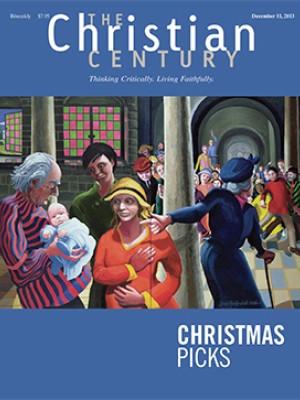Sunday, December 15, 2013: Isaiah 35:1-10; Luke 1:46b-55; Matthew 11:2-11
The lectionary texts tell us that Advent is a time to look forward to Christ’s second coming rather than back to his first. Yet most churches prefer Christmas pageants to second coming pageants. Given all the doom and gloom that accompanies apocalypse, they may be concerned about scaring the kids.
But Christmas pageants can be scary too. In my childhood church, the star of the show was played by a doll. Bothered by the Word-made-plastic, we decided to install a live baby Jesus, played by Mary’s three-month-old baby brother, Trevor. That year, as if on cue, the choir sang, “No crying he makes,” and baby Jesus, with the sharp hay stabbing holes in his backside, let loose a bloodcurdling scream. Mary, who’d heard Trevor’s wailing at home, wheeled around and shouted at him to shut up. This didn’t go over well; you’re not supposed to yell at Jesus.
Read our latest issue or browse back issues.
The next year we went back to baby dolls. But I preferred the screaming Jesus. If Jesus could get upset, then I could too, and not worry that Santa wouldn’t bring me what I wanted for Christmas. This is the good news about Jesus’ second coming. You get everything you could ever want. Isaiah 35 describes it as so good that “the desert shall rejoice and blossom; like the crocus it shall blossom abundantly, and rejoice with joy and singing.” That the desert sings is momentous—the desert stood for Israel’s barren wasteland of unbelief. But now, in Isaiah’s Advent preview, grace blossoms anew. Those whose lives collapsed and who sat head in hands, fearful, anxious, guilty, despairing, now have their loads lifted, their fears expunged, their despair overtaken by hope. What makes the difference? The Messiah makes the difference. He comes to his people—with a vengeance!
Jews in Luke’s Gospel believed that Isaiah’s Messiah would bring God’s vengeance to bear on their Roman oppressors. Caesar Augustus decreed a world census—a tax roll designed to tighten the empire’s grip on its subject peoples. Caesar Augustus made the Roman republic a dictatorship, a power grab he reinforced by proclaiming himself divine. His census compelled Joseph and Mary to journey to Bethlehem, thus setting the stage for the nativity as an act of political resistance. When the angels announced to the shepherds that a Savior had been born, those hearing the story immediately understood that Caesar’s blasphemous claim to being savior of the world had been repudiated.
Mary magnifies the political ramifications of her pregnancy in the song she sings in Luke 1. She belts out a triumphant tune, praising God for the salvation emerging in her womb, a Savior to rescue those browbeaten and bankrupted by Roman tyranny. Her song resounds with rescues of old, after captivity to Egypt and Assyria and Babylon. “He has shown strength with his arm,” she sings, “he has scattered the proud . . . brought down the mighty from their thrones . . . he has sent the rich away empty.”
The proud, the powerful and the prosperous get depicted throughout the Gospels as God’s enemies—not because they are rich and powerful, but because of the ways they abuse their riches and power. They presumptuously grab social status and clout, excluding those considered to be unacceptable—the humble, the weak and the poor. Societies tend to label the excluded as “less fortunate,” but in most cases fortune has nothing to do with it. Instead, humility is a dire consequence of humiliation, weakness is the consequence of domination, and poverty is the outcome of economic disparity—all imposed by the powerful and proud, whether deliberately or due to callous indifference.
With so much family and relational guilt already present at Christmas, it’s probably best not to pile on social guilt too. But Mary is not singing to make anybody feel guilty. She’s singing about hope fulfilled—and Jesus isn’t even born yet.
Mary’s tune soon changes from victorious singing to scandalous hand-wringing. Her husband Joseph contemplates divorce, as everybody knows the baby isn’t his. Caesar’s coerced relocation forces Mary to give birth in a feed trough. And instead of toppling tyrants, Jesus gets toppled himself. Instead of lifting up the humble, Jesus gets strung up, leaving the humble as humiliated as ever. No wonder John the Baptist wondered whether they should be looking for another messiah.
Perhaps Mary is singing about heaven: pie in the sky in the sweet by-and-by waits for those who eat humble pie here. But in heaven things don’t look much better. Turn to John’s apocalypse where you’d expect to see the returning Jesus roaring as the lion of Judah and you’ll see Jesus not as a ferocious King of the beasts but as a bleeding baby of beasts, a vulnerable lamb that’s been butchered. Isaiah predicted this too. The Messiah was to be “oppressed, and . . . afflicted,” led “like a lamb” to the slaughter, on earth as it is in heaven.
It doesn’t look like much of a victory or revolution. But looks can be deceiving. This is the irony of the gospel. A lion conquers by inflicting death, but the Lamb conquers by dying. The heir of King David rides out to wage war, but the Son of God suffers all the casualties. The Lamb of God takes away the sins of the world by taking all the sins onto himself. He does justice through the injustice of the cross. Revolution comes not by political uprising but by Jesus rising up from the dead. Resurrection ushers in a new heaven and a new earth that rejoices out loud. God wins by losing, and so we do too.





